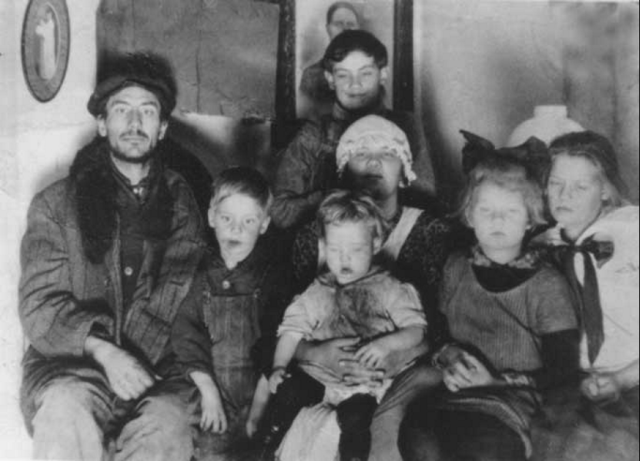
The Sam Thompson family, about 1919, on the Squaw Creek farm. Left to right: Sam Thompson, George Thompson, Pearl (Bouvran) Thompson, Floyd Thompson (behind his mother), Lyman Thompson (on his mother’s lap), Juanita Thompson, Aleda Thompson.
Sam and Pearl Thompson, my grandparents, lived on Squaw Creek, near Black River Falls, for nearly a decade, but I’ve found it difficult to discover many details about their lives on the farm there. However, Dale Thompson conducted a taped interview with my Aunt Aleda (Thompson) Jennings very shortly before her death, and as the second-oldest Thompson child, she was able to recall that period. (Dale has very kindly given me a transcription of her remarks.) Unfortunately Aleda’s memory was beginning to fail by then and was sometimes unreliable; still, the interview is almost the only record we have of that period of the Thompson family’s life. Here is a very abridged version of her recollections of the Squaw Creek farm with my own comments interspersed.
Aleda began this part of the interview as follows: “Maybe I was 6 or 7 years old when we moved out in the country and then we lived out there until I was about 15 in 1924 when we moved into town.” Since Aleda was born in 1908, and we know (again, from Aleda) that Sam and Pearl were living above the Bouvran Saloon at the time of the great flood of 1911, that means the family stayed on in town a few more years before moving to the farm. And from other sources it is clear that they bought 125 Roosevelt Road in late 1925, at about the time that Sam began working for the local box factory. (However, Aleda was also convinced, later on in the interview, that the Thompsons moved into Black River Falls in 1923.)
Aleda described her father as a sharecropper who was able to keep only a fourth of the income from the farm. She claimed that the owner of the property was a Mr. Holmbeck, but I am skeptical about that, because his name does not appear in any Black River Falls directories or censuses from that period. A possible alternative might be Isaac S. Hollenbeck (1874–1956), who was living in Alma Center in 1910. (Aleda said in passing that Holmbeck “was a sheriff here in town,” and Isaac Hollenbeck did indeed serve as a sheriff in his later years.)
On the other hand, when Sam registered for the draft in 1918, he identified himself as a farm laborer working for Albert Gilbertson, and on a 1914 map I have found several tracts of land just south of Squaw Creek owned by other members of the Gilbertson family.
When Dale asked her about the crops raised on the farm, Aleda replied, “Corn. . . and wheat. We had to take out the horses and bring the grain into the granary. After we got home from school, we would have to go up in the woods and get the cows. Throw down hay. Gather eggs.”
There is no doubt that the Thompsons experienced severe poverty at Squaw Creek. Aleda used this grim language to sum it up: “We never had butter. Going to school out there in Squaw Creek was where I got my first hot meal, you know like they serve now. We had a burner, kerosene stove and they would make mashed potatoes. That was our hot meal.”
All of the Thompson children (except for Dottie and perhaps Lyman) must have spent some years at the old two-room Squaw Creek School, which later burned down in November 1950.

The old Squaw Creek School
Advertisements Share this:




